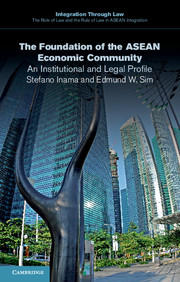Executive summary
Published online by Cambridge University Press: 05 May 2015
Summary
This book provides a critical overview of the legal and institutional foundations of the ASEAN Economic Community (AEC), an ambitious plan to create a single economic entity in Southeast Asia. If successful, the AEC would create a tremendous production base and market that would rival nation-states such as China and India.
The difficulty for the AEC is that, unlike nation-states, ASEAN does not have sufficiently developed legal and institutional foundations. This deficiency goes back to the founding of ASEAN as first and foremost a political grouping during the Cold War, with economic considerations being of secondary importance. Although competition since the end of the Cold War has spurred economic cooperation in Southeast Asia, the continuing emphasis on political and diplomatic matters has limited such cooperation.
ASEAN has maintained an informal decision making process based on consensus among its member states and ASEAN member states have not delegated any power to supranational entities for economic matters.
The introduction of the ASEAN Charter in 2007, intended to implement greater emphasis on rules in ASEAN's operations, has helped in a somewhat limited fashion. Furthermore, with regard to economic matters, the ASEAN Charter also prioritizes the creation of a single market and a single production base, even though the latter is more achievable politically and would more quickly generate benefits for the general population.
In this book the AEC, ATIGA, and other relevant ASEAN legal instruments are analytically examined to conclude that the AEC legal texts do not provide the tools, nor the juridical arsenal to establish the single production base and a fortiori, the single market.
ASEAN has undertaken the complex task of creating a single economic entity but without a single regulator. The ASEAN Secretariat has very limited powers, with almost all decisions still being made by the ASEAN member states themselves. Nor have the ASEAN member states used dispute resolution to enforce the terms of the AEC agreements and commitments. In many cases ASEAN member states prefer to use non-ASEAN legal norms and forums to resolve their disputes.
- Type
- Chapter
- Information
- The Foundation of the ASEAN Economic CommunityAn Institutional and Legal Profile, pp. 197 - 200Publisher: Cambridge University PressPrint publication year: 2015

